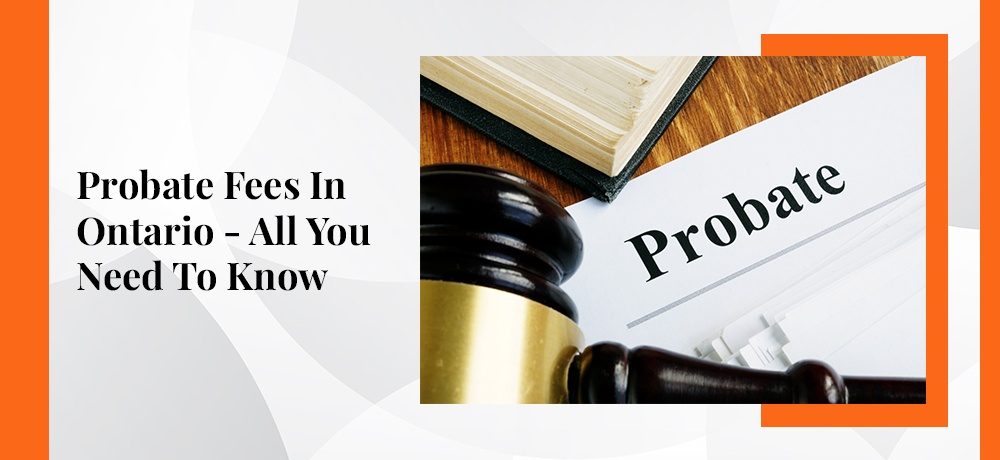Probate Fees In Ontario - All You Need To Know

Losing a loved one can be a challenging and emotional time. The probate process can be a complicated and intricate process. However, understanding the probate process, its costs, and the responsibilities of an executor is crucial for anyone who is a beneficiary, an executor, or is planning their estate. In this blog, we will provide an overview of the probate process in Ontario, break down difficult terms and concepts, and outline the costs associated with probate.
Probate is the legal process of validating a will, appointing an executor, and distributing the assets of a deceased person. In Ontario, probate fees are known as Estate Administration Tax (EAT). At Marwah Law, our vision is to redefine the legal profession and provide simple, smart, and innovative legal services to clients across Ontario. With that said, let's dive into the probate process in Ontario.
Understanding Probate
Probate is necessary when the deceased has left behind assets, such as real estate or financial investments, that require legal authority to transfer ownership. The probate process helps ensure that the deceased's wishes are carried out according to their will and that their estate is administered in accordance with the law.
The terms "probate" and "Certificate of Appointment of Estate Trustee" are often used interchangeably in Ontario. The Certificate of Appointment is the document issued by the court that confirms the appointment of the executor (called an Estate Trustee in Ontario) and validates the will.
The Probate Process in Ontario
The probate process in Ontario involves several steps:
1. Locating the Will: The first step is to locate the original will, as copies are not accepted by the court.
2. Identifying the Executor: The will typically names an executor who is responsible for administering the estate.
3. Preparing the Application: The executor must complete and submit the appropriate forms to apply for a Certificate of Appointment of Estate Trustee. These forms include:
-
Form 74.4 – Application for Certificate of Appointment of Estate Trustee with a Will
-
Form 74.6 – Affidavit of Execution of Will or Codicil
-
Form 74.14 – Notice of an Application for a Certificate of Appointment of Estate Trustee with a Will.
4. Valuing the Estate: The executor must provide an accurate estimate of the value of the deceased's assets, including real estate, bank accounts, investments, vehicles, and personal property.
5. Paying the Estate Administration Tax (EAT): The EAT must be paid to the court when submitting the application. The tax is calculated based on the value of the estate.
6. Distributing the Assets: Once the Certificate of Appointment is granted, the executor can begin administering the estate, which involves paying debts and taxes, notifying beneficiaries, and distributing the assets according to the will.
7. Preparing Estate Accounts: The executor is required to keep detailed records of all financial transactions related to the estate and provide estate accounts to beneficiaries.
Responsibilities of the Executor
The executor's responsibilities include:
-
Gathering and safeguarding the deceased's assets
-
Paying debts, funeral expenses, and taxes
-
Identifying and notifying beneficiaries
-
Distributing assets according to the will
-
Preparing and maintaining estate accounts
-
Filing tax returns for the deceased and the estate
-
Obtaining a clearance certificate from the Canada Revenue Agency (CRA)
Costs Associated with Probate
The main costs associated with the probate process in Ontario are:
a. Estate Administration Tax (EAT): EAT is calculated based on the value of the estate:
-
$5 per $1,000 for the first $50,000 of the estate value
-
$15 per $1,000 for the estate value over $50,000
There is no EAT payable for estates with a value of $1,000 or less.
For example, for an estate valued at $300,000, the EAT would be calculated as follows:
-
For the first $50,000: $50,000 ÷ $1,000 = 50; 50 x $5 = $250
-
For the remaining $250,000: $250,000 ÷ $1,000 = 250; 250 x $15 = $3,750
-
Total EAT = $250 + $3,750 = $4,000
b. Legal Fees: Executors may choose to hire a lawyer to assist with the probate process. Legal fees can vary depending on the complexity of the estate and the lawyer's hourly rate. Some lawyers charge a flat fee or a percentage of the estate value.
c. Court Filing Fees: There is a court filing fee of $138 for the Application for Certificate of Appointment of Estate Trustee with a Will.
d. Other Costs: Additional costs may include appraisal fees for valuing assets, accountant fees for tax preparation, and any expenses incurred by the executor while carrying out their duties.
Tips for Reducing Probate Costs
a. Joint Ownership: Assets held in joint ownership with a right of survivorship, such as real estate or bank accounts, can pass directly to the surviving owner without going through probate.
b. Designated Beneficiaries: Naming a beneficiary directly on financial products like life insurance policies, RRSPs, and TFSAs can help these assets bypass probate.
c. Gifting Assets: Transferring assets to beneficiaries before death may reduce the value of the estate and, consequently, the EAT.
d. Establishing a Trust: Setting up a trust can help transfer assets to beneficiaries without going through probate, although there may be additional costs and complexities involved.
Understanding the probate process in Ontario and its associated costs is essential for estate planning and administering an estate. Executors play a critical role in the process, and their responsibilities should not be taken lightly. There are strategies to reduce probate costs, but it is crucial to consult with legal and financial professionals to ensure these methods align with the deceased's wishes and comply with the law.
At Marwah Law, our team of experienced legal professionals is dedicated to guiding you through the probate process and providing tailored solutions to meet your needs. We understand that each client's circumstances are unique, and we work to provide personalized advice and support for each case.